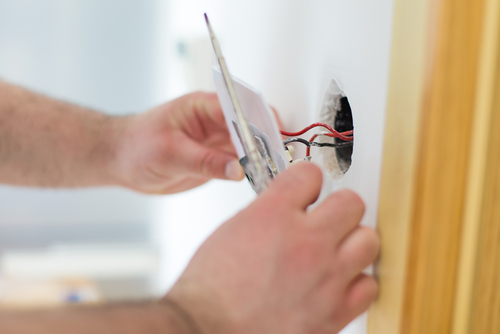Homeowner’s insurance will cover most electrical problems within your home, with some exceptions. Many insurance companies will simply deny claims submitted for older homes with outdated electrical wiring if an issue arises. They will force you to purchase additional coverage referred to as special rider/endorsement for wiring that is made of knob-and-tube wiring or aluminum wiring.
What is Knob-and-Tube Wiring?
Between the beginning of the 1800s all the way up until the 1940s, knob-and-tube electrical wiring was the most common electrical wiring in residential dwellings. Knob-and-tube electrical wiring is a system built from ceramic knobs and porcelain tubing combined with rubber to isolate the wiring. This is extremely unsafe due to the fact that there is no grounding conductor in place. A grounding conductor connects electric equipment or an electric wiring system’s grounded circuit to a grounding electrode or electrodes. If your kitchen and/or bathroom appliances are at risk of being exposed to water, this could lead to damage within these rooms in your home. This type of wiring experiences damage due to long-term exposure to the elements.
It is important to receive an inspection from a certified electrical technician to determine what type of changes or accommodations that previous homeowners may have implemented to adapt to this type of wiring.
What is Aluminum Wiring?
In the 1960s and 1970s, aluminum was preferred by building companies over copper. This made aluminum the most common material used for building new structures. Copper was much more expensive than aluminum during that time, meaning that a large number of homes between the 1960s and 1970s were built using aluminum wiring. The Public Safety Commission discovered that aluminum wiring is 60 times more likely to catch fire than copper wiring. Aluminum wiring breaks down faster than copper wiring. Copper wiring is also highly fire-resistant and does not overheat as aluminum wiring does.
When Does Homeowner’s Insurance Cover Electrical Problems?
Homeowner’s insurance will usually cover most problems, such as appliance breakdowns, electrical sockets malfunctioning, and power surges. The approval of coverage from your homeowner’s insurance company depends on the type of wiring in your home, though. They determine coverage based on the age of your home and the type of electrical wiring within it.
If your home is up-to-date with copper electrical wiring, you are more likely to receive higher coverage long-term, as well as having safer electrical wiring. If your home still consists of outdated electrical wiring, you will more than likely be required to purchase a separate special rider to receive coverage from your homeowner’s insurance.
An insurance rider is added to your policy for an additional premium you are required to pay. This increases your coverage and applies coverage to more areas in your homeowner’s policy that may not be covered originally. You will also more than likely experience higher premiums with this type of coverage as well.
In order to receive the best coverage possible by your homeowner’s insurance policy, it is best to receive an inspection of your home and replace any outdated electrical wiring that may have been used to initially build your home.
To learn more about homeowner’s insurance and what it may cover in your home, reach out to All Things Insurance today!

